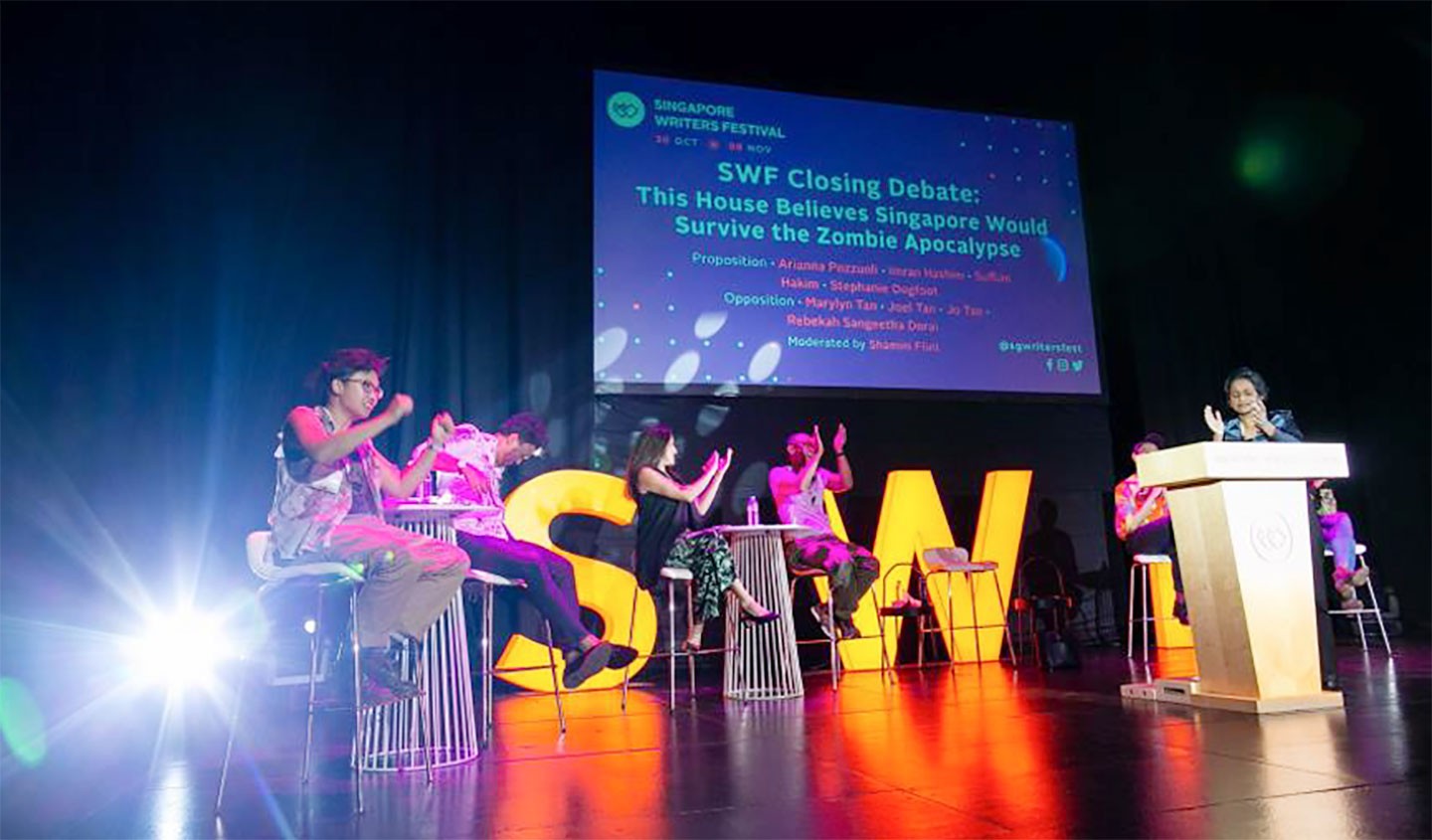SINGAPORE – The 23rd Singapore Writers Festival (SWF) concluded its first-ever digital edition on a high note on 18 November 2020 after an extraordinary 20-day line-up of over 160 programmes by more than 200 authors and presenters from Singapore and beyond. Organised by the National Arts Council (NAC), this year’s festival brought together homegrown and international writers, thinkers, and artists in a common digital space where they connected with audiences over a shared love for stories. With conversations around this year’s theme of ‘Intimacy’, SWF 2020 was a timely exploration of what it means to connect with and draw inspiration from one another despite being apart in a time of distance.
Reaching international and diverse audiences through digital formats
For the first time, SWF was able to leverage the digital format to extend the Festival duration for an additional 10 days, until 18 November (from the original schedule of 30 October to 8 November). With over 80 programmes made available to new and existing pass holders, the Festival reached over 37,000 views. It was also able to offer new ways of experiencing the Festival, through programming such as interactive live chats amongst festival-goers and access to programmes on-demand after they have been live streamed.
SWF 2020 attendee, Vanessa Tan, shared that, “Every year, there’s always something different which is one of the things I really enjoy about SWF. With the digital medium, we could watch the programmes whenever we wanted and I love that the online programmes have subtitles because it allows for me to rewind it, take notes, and really read what was said. The chat-only functions are also really interesting because you get to interact with mysterious strangers on the internet, but you kind of feel that you’re connecting with them so I do think the digital edition was a success.”
The digital format also created a different festival space for participating authors. “It was kind of unnerving because you’re always dependent on the whims of technology, but at the same time there’s also something really intimate meeting someone in this way without this massive audience in front of you, so it turns it into an actual conversation instead of a performance which was very liberating.”, said Joel Tan, Singaporean playwright and dramaturg based in London.
Upholding its reputation as Asia’s premier multilingual literary festival and a pinnacle event in Singapore’s arts and culture calendar, SWF 2020 saw a record-breaking number of 10 international heavyweights from Canada, the US, the UK, and China gracing the festival. This includes Margaret Atwood, of the 2019 Booker Prize-winner The Testaments; Art Spiegelman, of acclaimed Pulitzer Prize-winning graphic novel Maus; Zadie Smith, of best seller and award-winning White Teeth; and Liu Cixin, of Hugo Award-winning The Three Body Problem.
SWF 2020 also commissioned 20 literary programmes in innovative digital formats such as augmented reality-enabled mobile phone application DGNoir 1971, interactive email game Play This Story: The Book of Red Shadows, and virtual exhibition The Visitation. This is the highest number of ground-up initiatives commissioned by SWF through an open call, demonstrating the strength of Singapore’s arts and literary community as they adapt with the times to present the best of SingLit.
Over 20% of SWF 2020’s viewership was made up of international audiences residing in at least 10 other countries, including India, Japan, the US, and the UK. This is a testament to the range of compelling programmes that resonated with audiences globally despite the oversaturation of digital content in the time of COVID-19. The edition also saw an interesting shift in demographics. While the festival continues to be strongly supported by youths aged 25 to 34 years old who make up 27% of participants, the proportion of festival-goers aged 55 years and older increased by three folds, making up another 27% of participants too.
In conjunction with the resumption of live performances in Singapore, SWF 2020 offered audiences the opportunity to experience select festival programmes in-person. One such in-venue event is the crowd-favourite SWF Closing Debate, where speakers sparred to a full house of 50, in accordance with safe management measures, as they determined whether Singapore will survive the zombie apocalypse. The hybrid format saw a 32% increase in audience as festival-goers were able to catch the closing debate both in-person and online.

Advocating diversity and inclusion through the arts
SWF 2020’s digital offerings were cross-cultural, interactive, and inclusive, carefully curated with the local and regional literary community for people of all ages, backgrounds, and abilities. English translations were provided so that content is accessible to a wider range of audiences, such as this year’s multisensorial Literary Pioneer Exhibition exploring the legacy of seminal Tamil writers P Krishnan, Singai Ma Ilangkannan, and Rama Kannabiran which is presented in both English and Tamil. The exhibition was made available till 31 December 2020.
Vaanathi Rajandran, daughter of P Krishnan shared, “I am very proud and honoured that my father was included as one of the Literary Pioneers in SWF 2020. It is an acknowledgement of his years of contribution to the Tamil literary world. The inclusion has allowed more people to appreciate his works, commitment and passion for Tamil literature and the Tamil language. This digital edition was also well curated with a good coverage of literary works and writers across the different languages.”
Championing inclusivity in the arts, SWF 2020 co-presented Vis a Visibility with Sing Lit Station, a panel discussion where prolific writers from the Philippines, Indonesia, and Thailand addressed the invisibility of people with disabilities in Southeast Asian literature. Very Special Arts Singapore [VSA(S)] also presented VSA(S) Out Loud in conjunction with SWF 2020, where creative expressions from artists who are neurodiverse, deaf, and disabled came alive through collaborations with Writing Through and Jazz Association (Singapore) (JASS).
While inclusive programming was introduced in SWF 2016, this year’s digital edition allowed for enhanced elements such as live captioning and surtitling so that the discussions and performances could be enjoyed by people of diverse abilities. This year’s programmes continue to illustrate SWF’s efforts in providing a platform for lesser-heard voices in the literary arts while fostering understanding of various communities within the region.
SWF 2020 continues to develop future audiences through engaging and meaningful programmes for children and youth. This year marks the second edition of SWF Youth Fringe, presented in partnership with Singapore Book Council and co-curated by a panel of passionate Youth Curators. A multitude of programmes were also introduced as part of SWF Playground, from craft-making and storytelling to sold-out workshops with established home-grown and international literary personalities such as Australian cartoonist Gavin Aung Than and Singaporean writers Anittha Thanabalan and Yeoh Jo-Ann.
Spotlighting the Singapore literary scene
While the pandemic posed unprecedented challenges for Singapore’s arts scene, the 2019 Population Survey on the Arts released by NAC pointed towards significant potential to grow local and international audience participation and engagement through digital platforms1. As Singapore’s largest literary festival, SWF 2020 spearheaded fresh ways for writers and participants to immerse themselves in literature in this new normal while reaching out to new participants and audiences. The festival welcomed seniors who were first-time writers through Connections – Original Monologues From Our Homes, and spotlighted a variety of programme formats such as radio plays and podcasts as part of Night Spin 182.7FM, presented by The Arts House, SWF’s key programme and venue partner. Audiences were also invited to experience an intimate phone experience in A Call Away, or be encouraged by autobiographical poems and prose exploring mental health through microsite Sit With Me.
The successful programming of SWF 2020 helped to strengthen the awareness and reception of SingLit through the festival, where conversations about intimacy led by established Singaporean authors received strong viewership. These programmes include Talking Across Pages: The Anthology as an Act of Intimacy, which features 2005 Young Artist Award recipient Alvin Pang, and The Aesthetics of Intimacy, which features Singapore Literature Prize-winning Danielle Lim, among other Singaporean writers.
Festival Director Pooja Nansi said, “The pandemic has thrown us many curveballs, and yet we saw an increasingly diverse community of festival-goers and presenters stand by us, exploring the meaning and significance of intimacy. This was an unforgettable experience for the literary community as we witnessed how SWF evolved and progressed in the digital sphere. It is clear that while the medium for the literary experience may have changed, the spirit of reading or engaging with literature has not. We sincerely thank all our partners, sponsors and friends in supporting us through our landmark first digital edition. We are excited to put together SWF 2021, using our learnings and achievements as steppingstones towards a stronger local and international literary scene.”
Preparations for SWF 2021 are underway. The festival is slated to take place from 5 to 13 November 2021. SWF’s outreach programme for students, teachers and the community Words Go Round (WGR) will take place from 1 to 13 March 2021. Interested educators and organisations can head to singaporewritersfestival.com/wgr from 11 January till 5 February 2021 for bookings.
singaporewritersfestival.com | @sgwritersfest | #SWF2020 #SGCultureAnywhere










